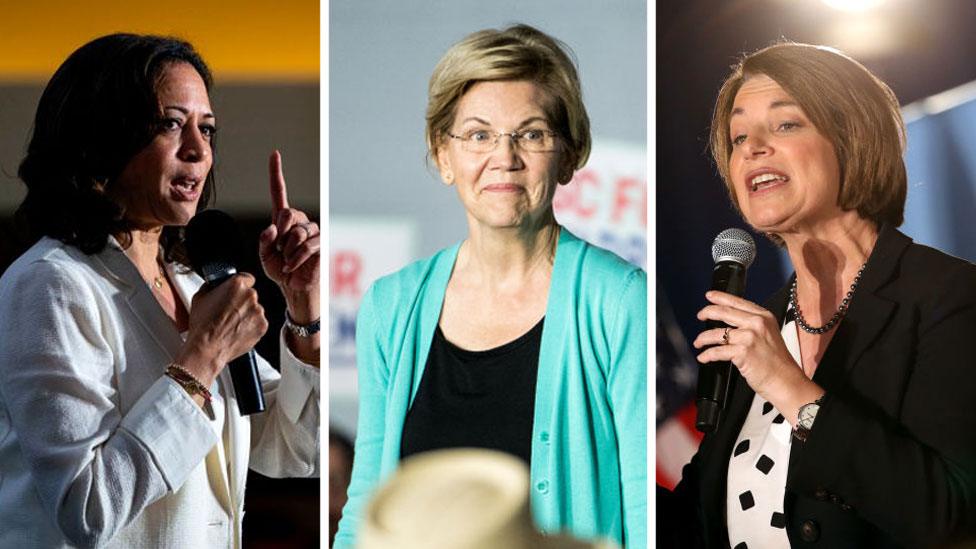Democratic debate: The winners and losers
- Published
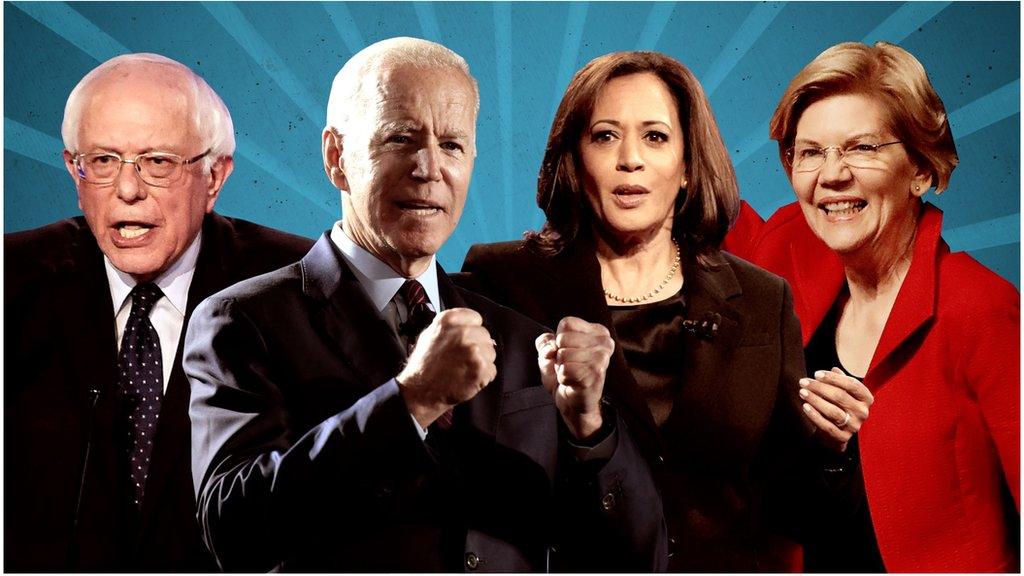
Twelve Democrats competing for the right to take on Donald Trump in 2020 have taken part in another debate. Here's who had a good evening and who may now be enduring a restless night.
It's autumn. The days are getting shorter, and so is the life expectancy of all but the strongest presidential campaigns.
While the debate stage in Ohio was crowded with a dozen candidates hoping to become their party's nominee next year, the presidential race has effectively separated into three tiers both in terms of money and poll standing - the front-runners, the middle of the pack and the stragglers.
Here's a look at each tier, and the winners and losers in those groups.
Front-runners
Winners: Elizabeth Warren, Bernie Sanders
Elizabeth Warren, who has been rising in the polls all year, knew she was going to take some shots now that she's reached the top of the pack. She was not wrong.
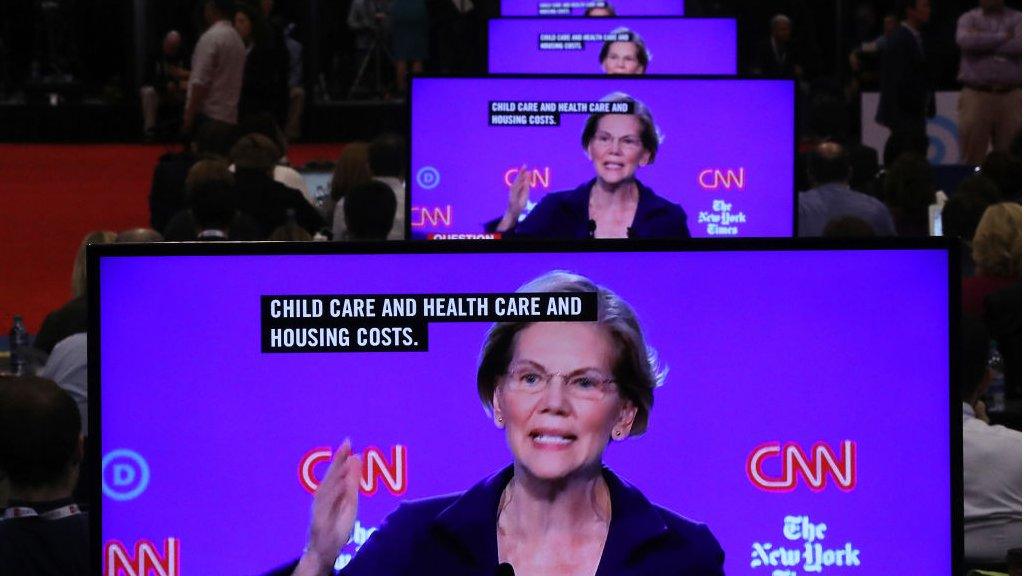
Once again, her refusal to acknowledge that her universal healthcare plan raises some taxes was targeted by the more moderate candidates. She doggedly refused to be pinned down, but for once the attacks - particularly from Pete Buttigieg and Amy Klobucher - felt like they had more bite. She can keep dancing, but her weakness here isn't going away - and could become a real problem in a general election.
Despite this, she had her share of memorable lines. Her early support for Donald Trump's impeachment helped give her answer on the topic extra punch: "Impeachment is the way that we establish that no one will be able to break the law over and over again without consequences." Her defence of a wealth tax, saying that she prefers to invest in a generation of Americans and not "protect billionaires," will resonate with many Democrats.
And when Joe Biden spoke about his efforts to get votes for Warren's financial reform legislation in 2009, she pointedly praised Barack Obama - and not the vice-president - for his support. It was a subtle way of prying Biden away from his embrace of Obama's political legacy.
Meanwhile, Bernie Sanders was Bernie Sanders. After six years on the national political stage, he's a known quantity. Given that he recently had a heart attack, however, a typical Sanders performance counts as a win.
Loser: Joe Biden
At this point, it's clear. Joe Biden's unsteady debate performances aren't a result of his being rusty from a few years out of politics. The Biden that dissected Paul Ryan in the 2012 vice-presidential debate isn't coming back.
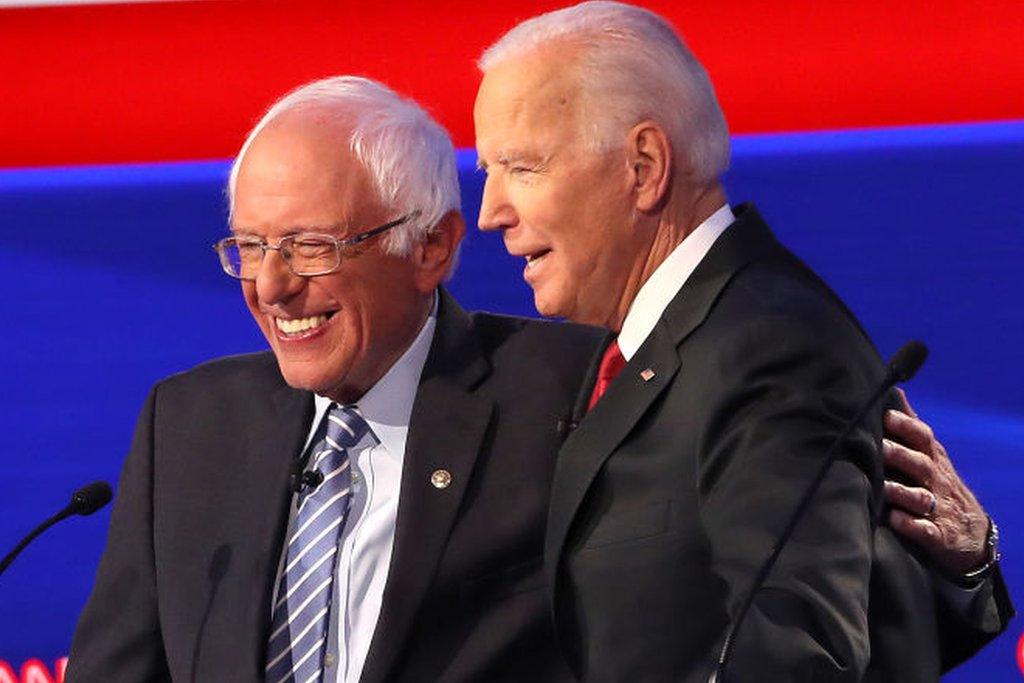
His response to the predictable question about his son Hunter Biden's Ukrainian lobbying work was unemotional, when righteous indignation would have been appropriate. He was largely sidelined during the healthcare fireworks. He finally showed some life talking about foreign policy and Syria, calling Trump's military withdrawal "shameful". And while he mixed it up with Sanders and Warren near the end of the debate, the two-on-one fight wasn't to his advantage.
For long stretches of the debate Biden seemed to disappear into the background. That may not be all that bad, given his current standing in the polls. And even his occasional stumbles in his answers may not cost him much support. But as the field narrows in the months ahead, he will need to gain strength to keep pace with Warren. More debates aren't going to help him do that.

Middle of the pack
Winner: Pete Buttigieg
There are really only two candidates left in the middle of the Democratic pack these days. One was a winner; one was a loser.
WATCH: Warren evades questions about tax rises - and her rivals pile on
Buttigieg put together a solid performance from start to finish. His critique of Warren's healthcare plan as divisive and unrealistic, given that many Americans don't want to give up their private health insurance, was effectively explained. He was the only candidate besides Biden who seemed to speak authoritatively on US foreign policy, describing Trump's Syrian withdrawal as a betrayal of American values. His heated exchange with Beto O'Rourke over gun control, when he blasted the Texan for questioning his "personal or political" courage, was a win.
If Democrats are looking for a practical politician who is not named Joe Biden, Buttigieg made a strong case that he's the guy.
Loser: Kamala Harris
The California senator set a high bar for herself with a strong performance in the first debate. It's a bar she has consistently failed to meet ever since. She picked a fight with Warren over whether to ban Trump from Twitter, but it's unclear that's an issue that many Democrats care about.
Otherwise, she was a non-factor - especially when compared to Buttigieg. Throughout her campaign, Harris has tried to straddle the gap between the progressives and the moderates. What's that meant during these debates, however, is that instead of appealing to everyone, she's made an impression on no-one.

Stragglers
Winners: Amy Klobuchar, Cory Booker
Cory Booker has been a "winner" in pretty much every debate he's participated in this year - for all the good it's done him. He's sharp, he's funny, he's personable - and he's still bouncing along at low single digits in most polls. The "also debating well" award should be named for him at this point.
On several occasions, the New Jersey senator expressed frustration that the candidates on the stage were spending too much time attacking each other. It's a sentiment that most Democratic voters will enthusiastically endorse - and win Booker absolutely no new support.
Amy Klobuchar, on the other hand, has been a non-factor during many of these debates. This time, she stood out. She sparred with Elizabeth Warren on healthcare in particular, suggesting that her plan was a "pipe dream" and saying she had an obligation to tell the American people where to send the invoice for her plan.
The challenge for Klobuchar is her pitch is to moderate Democrats - voters who are sticking with Biden or considering Buttigieg. If the Minnesota senator doesn't make a move, this could be her last debate. If it is, she can comfort herself with the thought that she went out on a high note.
Losers: Everyone else
With 12 candidates on the stage, it was hard for many to get a word in edgewise. Some had their moments in the spotlight - Beto O'Rourke on gun control, Tulsi Gabbard on Syria, Andrew Yang on the threat of automation - but they were either not entirely positive or not strong enough to make a lasting impression.
Julian Castro was competent, but unremarkable. Tom Steyer had the challenge of introducing himself to America in his first debate appearance, but he mostly served as a billionaire-foil for others.
For most in this group - and the other candidates still running but not on the Ohio stage - a cold winter is coming very, very soon.

Who will take on Trump in 2020?

- Published7 October 2019
- Published17 September 2019
- Published1 October 2019
- Published21 August 2019
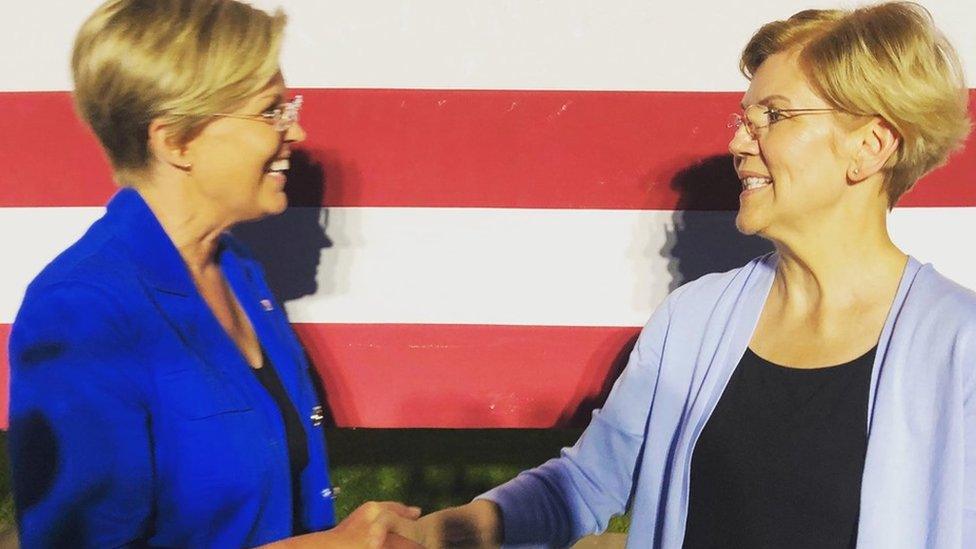
- Published11 September 2019
